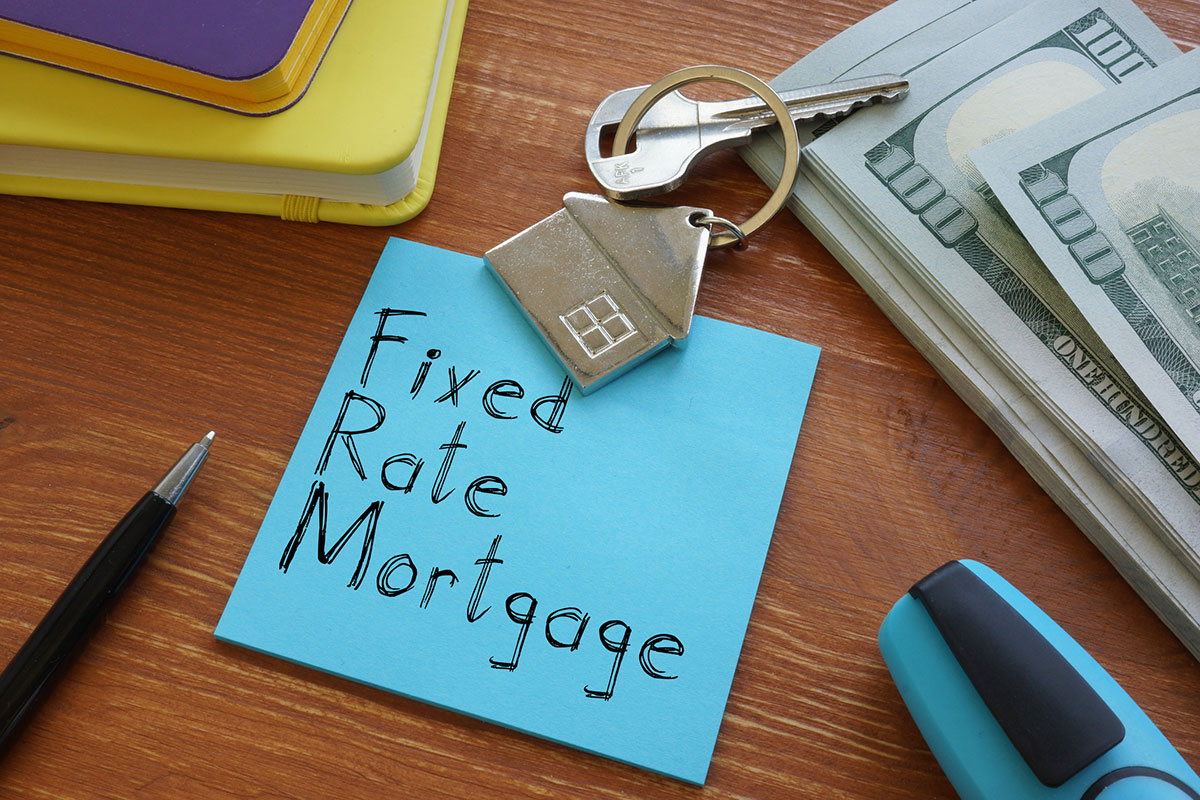A fixed rate mortgage is the most common type of home loan. They’re often the easiest loans to qualify for and because they have a fixed interest rate, you’ll always have predictable payments. However, just because they’re popular among homebuyers doesn’t always mean this loan option will be the right choice for you. As with any big financial decision, you’ll want to carefully weigh all your options for mortgage loans and explore the advantages and disadvantages of each.
There are some clear advantages to going with a loan like this, but there are several other factors you’ll have to consider, such as the current mortgage rate, your long term plans for the home, and your overall financial goals. Working with an experienced loan officer can help you take a step back and look at the big picture, but you’ll also need to do your own research. By doing so, you may find another loan type like an adjustable rate mortgage (ARM) fits your needs better. On the other hand, the comfort of having a predictable monthly mortgage payment for the entire loan term could be exactly what you want.
What Is a Fixed Rate Mortgage?

A mortgage is a type of loan you use to buy or refinance a house, condo, or other piece of real estate, and there are several types of home loans offered. The most popular by far is called a fixed-rate mortgage where a lender offers you a set interest rate that you keep for the life of your loan, making a monthly payment until you’ve paid off the principal balance. Fixed-rate home loans most often come with a term of 15, 20, or 30 years, meaning your monthly payments will be divided over this time period. In the end, you’ll have paid back the loan amount plus interest.
Borrowers can obtain these loans from several types of banks, such as traditional banks, credit unions, or online banking lenders. Alternatively, borrowers may qualify for a loan via a government-backed mortgage from the Department of Veterans Affairs (VA home loan), the United States Department of Agriculture (USDA loan), or the Federal Housing Administration (FHA loan). These federal loan programs are targeted toward low-income to mid-income borrowers who may not have the highest credit score or be able to come up with a large down payment. There are also eligibility and loan requirements which may mean you have to carry private mortgage insurance or pay certain fees.
The most common alternative to a fixed rate loan is an adjustable rate mortgage (ARM). With an ARM loan, you accept a fixed rate for an initial period (typically three, five, seven, or 10 years), and after this preliminary period is over, your rate will fluctuate either every six months or every year. ARMs will almost always give the borrower a lower initial rate than with a conventional loan, but after this time the rate is largely unpredictable. This makes it a great option for someone who knows they’ll be selling within a couple of years, but the unpredictable nature of future payments can (and should) give most buyers pause.
Pros and Cons of a Fixed Rate Mortgage
Fixed Rate Mortgage Pros
Easy to Understand
If this is your first time buying a home, you’re undoubtedly feeling overwhelmed by the entire process from saving money for a down payment, securing a loan, working with a realtor, and of course – finding a house you want to buy. One thing that can make this easier is taking on a loan with straightforward terms that are easy to understand.
Plus, if you’re shopping around for 30-year fixed rate mortgages (the most common type), it will be easy to compare one lender to another looking not only at the annual percentage rate, but also fee structures like closing costs, origination fees, title, and application fees. If you’re someone who likes to keep their finances simple and maintain a predictable personal budget, a fixed rate option will fit the bill.
Predictable Payment
Perhaps the biggest benefit of opting for this mortgage type is that it locks in a single rate that won’t change unless you refinance. This kind of predictability can be a huge selling point for a borrower who may be concerned about inconsistent income or expenses in other areas of their life. With a fixed mortgage rate, you can count on predictable payments for as long as you keep your loan.
It should be noted that your monthly payment may still increase slightly each year depending on how much your property tax goes up and how much you pay for mortgage insurance, but these will only be incremental changes that won’t affect your interest rate or principal balance. This means that you’ll know exactly how much your interest payment will be each month and how much will be going to your principal.
Protected if Rates Later Rise
Mortgage interest rates can fluctuate dramatically from year to year since they’re affected by economic conditions inside and outside of the housing market. In general, if the overall economic outlook for the country is positive, you’ll see higher interest rates, and when it’s looking more dismal you’ll see interest rates go down.
The average mortgage interest rate is also influenced by what the Federal Reserve does, how high inflation is, and even the unemployment rate. This all means that the rate you’re offered on any given day can be drastically different a year or two down the line. Someone who’s able to secure a 5.5% fixed mortgage rate now, may see this rate increase to 7.5% just a year later. When you choose a fixed-rate loan, these natural fluctuations won’t affect you at all unless you choose to refinance a mortgage by taking advantage of a lower rate.
No Prepayment Penalties
Some borrowers also like the predictable nature of a fixed rate loan because it allows them the flexibility to prepay toward the principal whenever they have extra cash flow. However, if you’ve decided to go with an adjustable rate mortgage loan, you could see a prepayment penalty. This is because lenders often offer borrowers a lower interest rate for the initial loan term. After all, they’re counting on earning a certain amount from the interest payments during this time.
If you pay off your loan earlier than expected your lender could charge you thousands of dollars to make up for their lost revenue. While not every lender will have this condition as part of an ARM loan, you will never see it for a conventional fixed-rate loan. This means as long as you meet your minimum mortgage payment, you can prepay as much or as little as you want each month with no penalty.
Fixed Rate Mortgage Cons
Have to Refinance to Take Advantage of Lower Rates
If you’re lucky enough to obtain a loan when fixed mortgage rates are low, you’ll have the peace of mind knowing you’ve locked in an interest rate that’s unlikely to go lower in the future. However, many borrowers who have little wiggle room when they buy (say they have to buy a new home before they can sell their old one) may be stuck with a higher interest rate for 15 to 30 years. The only way to change this is to refinance which is essentially taking out a completely new mortgage on your home. This means you’ll have to pay all the lender fees, appraisal fees, and closing costs again, which can total anywhere from 2% to 5% of your loan amount.
Could Pay More Interest Over the Life of the Loan
The most common fixed rate mortgage is a 30-year loan, meaning your monthly payments for your principal and interest are prorated over the span of 30 years. This often results in a fairly low monthly payment, but it also means the bulk of your money (especially at first) will be going straight toward interest and not toward your loan balance. For example, if you take out a home loan for $300,000 at 6% and pay it off over 30 years, you’ll end up paying more than twice the loan amount (over $350,000) in interest payments alone.
These large interest payments are one reason some borrowers prefer an ARM loan because you can obtain a lower initial interest rate and therefore put more of your money toward your principal balance. Or, if you opt for a 15-year fixed loan for the same amount, you’ll only be paying around $160,000 in interest over the life of your loan. It’s worth noting in this scenario, you’ll also have substantially higher monthly payments to contend with since you have less time to pay off the loan.
Less Negotiating Power with Lenders
To a certain extent, you can negotiate on nearly all home loans, but when you choose a fixed-rate loan, your options will be limited. A high credit score, large down payment, and low debt-to-income ratio will all work in your favor when trying to negotiate with your mortgage lender. That said, they only have so much leeway when it comes to what they can offer in terms of rates for a conventional loan. ARMs are more appealing to lenders because they get paid back faster and they earn more interest because of the shorter terms. This makes them more likely to want to work with you to find a mortgage plan you like.
Are Fixed Rate Mortgages Worth It?

Fixed-rate mortgages are popular for a reason. They offer reasonable mortgage rates, a predictable monthly payment, and the assurance that your rate will always stay the same. This alone is reason enough for millions of home buyers to enter into a loan that allows them to buy a home and start building their life.
On the other hand, if rates are high when you obtain your loan, you could be stuck with a large monthly payment, not to mention knowing that the bulk of your money will be going straight to interest. You always have the option of refinancing, but if refinance rates don’t go down or you don’t have enough home equity built up, you’ll have very few options.
The type of mortgage you get also depends on what you want to get out of your property. If you know you’ll only be staying in the area for a short amount of time and you have expendable income to address any rate hikes, an ARM loan may be preferable. But if you plan to stay where you are for the foreseeable future and want the financial stability a fixed rate mortgage can bring, then a fixed-rate mortgage is your best option.







